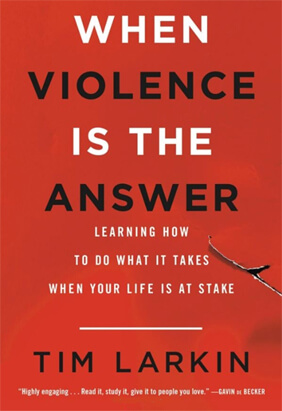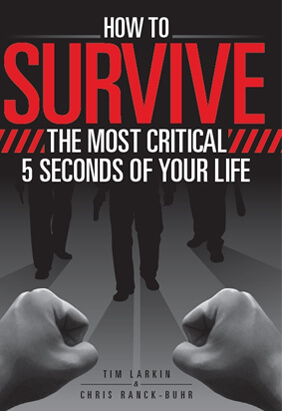- timlarkin
- Asocial Violence, Law Enforcement, striking, study, violence
SHOCKING STUDY REVEALS FITNESS NOT A FACTOR WHEN FIGHTING FOR YOUR LIFE
 How long do you think you’d last in an all-out fight for your life? A minute? Three minutes? As long as it takes?
How long do you think you’d last in an all-out fight for your life? A minute? Three minutes? As long as it takes?
 The people at Force Science put together a study to measure law enforcement personnel’s ability to recall crucial details after a grueling obstacle course meant to simulate a fight with an assailant, a foot chase and other physically demanding, high-stress situations.
The people at Force Science put together a study to measure law enforcement personnel’s ability to recall crucial details after a grueling obstacle course meant to simulate a fight with an assailant, a foot chase and other physically demanding, high-stress situations.
What they found during the “all-out effort on a heavy bag” portion of the test is of particular interest to our self-defense training:
“Most dramatic — and alarming — was the speed at which exerters depleted their physical resources. On average, the officers spent 56 seconds hitting the bag, although some either quit or were called out as thoroughly exhausted after as little as 25 seconds. The blows they were able to deliver ranged from a low of 73 to a high of 274. The average was 183. The overwhelming majority of hits were fist punches.”
“Reviewing time-coded video of the action, researchers were able to count second by second the number of times each participant struck the bag. The average officer peaked at 15 seconds. After that, the frequency of strikes fell in a sharp and steady decline.”
“‘The officers started out strong, driving hard with penetrating hits that visibly moved the heavy bag,’ [Dr. Bill] Lewinski reports. ‘But by 30 to 40 seconds, most were significantly weakened. They were not able to breathe properly, their cadence dropped, their strikes scarcely moved the bag if at all, and they were resorting largely to very weak, slowly paced blows that would have had little impact on a combative assailant.‘”
In effect, Blocksidge states in a paper he has written about the research, the exerters “delivering a concerted and sustained physical assault… ‘punched themselves out’ in a matter of seconds.”
Self defense training and physical conditioning had nothing to do with it.
Regardless of conditioning most of us should expect to be completely spent in 15 seconds of all-out assault effort. If we assume you’re going for nonspecific trauma, i.e., to “beat the crap out of him” you better hope he has less than 15 seconds of nonspecific trauma endurance in him. Unfortunately, most people have far more — the human body can take an awful lot of punishment in the form of bumps, bruises, lacerations and whatnot.
Far better, then, to focus your efforts for maximum effect; break something important inside of him so it doesn’t work anymore. The essential difference between nonspecific and debilitating trauma is that in one you’re asking the man to quit and in the other you’re making the choice for him.
If you can only count on having 15 good seconds, then you better be training to be effective inside of that time limit. And while it might be tempting to think of increasing your conditioning in the hopes of giving yourself more time, that idea was unfortunately dispelled in the study. The fitter officers hit harder initially but just ended up expending more energy per strike, exhausting themselves in the same amount of time as the less fit.
With TFT Self Defense Training, we have always actively trained to be effective inside of five seconds — we assume three to five seconds of chaos that you resolve with the first real injury. So the incident starts, and then you nail him in the side of the neck to knock him out. Done and done.
No wasted time, no wasted movement, no wasted effort. Everything is directed straight through a target, to smash it.
This is also why we stress the use of body-weighted strikes over the simple extension of the limbs (striking as opposed to punching and kicking) — when your muscles grow tired you can’t punch as hard, but you weigh the same whether you’re good-to-go or exhausted. Even winded you can still smash things with your mass.
It’s easier to train for results than to train to “go the distance”; it’s also easier to execute, and it aligns with a reality that, though constantly disappointing and often at odds with our own wishful thinking, must still be dealt with.
If training for the fight is an illusion, then our only option is to train for the knockout.
All Latest Posts
- WHATS MISSING IN ALL SELF PROTECTION TRAINING & WHY THE MEDIA LIKES IT THAT WAY
- SELF-DEFENSE AND FIGHT SCIENCE
- PREVENT VIOLENCE VS. DO VIOLENCE: PART I
- PREVENT VIOLENCE VS. DO VIOLENCE: PART II
- SELF DEFENSE TRAINING: KILLING WITH RULES
- SELF-DEFENSE: STOP FIGHTING AND DELIVER A BEATING
- SELF PROTECTION QUESTION: HOW CAN I JUSTIFY THE USE OF VIOLENCE?
- SELF-PROTECTION MENTALITY: I WAS PREOCCUPIED WITH WHAT I WAS GOING TO DO TO HIM
- FIRST STRIKE: HOW AND WHY YOU SHOULD LAND IT
- INTIMIDATION DURING SELF PROTECTION IS A SUCKER’S GAME
- ANTISOCIAL CONFRONTATION: AGGRESSIVE, BADASS OR DEADLY?
- DEBILITATING INJURY: HOW TO TAKE A PUNCH
- TARGET FOCUS TRAINING PRINCIPLES IN A NUTSHELL
- SELF PROTECTION LESSON: MOVE WITH THE INJURED MAN
- SELF-DEFENSE CLASSES: WHO HAS THE REAL KOOL-AID?
- THE “NUCLEAR OPTION” OF LIFE OR DEATH SELF-DEFENSE
- INJURY IS THE ONLY GOAL OF VIOLENCE
- WHEN IS IT TIME TO LEARN SELF-DEFENSE TECHNIQUE?
- La guía de autodefensa de un teleadicto y otras historias
- Ein Couch-Potato-Leitfaden zur Selbstverteidigung und andere Geschichten
- SELF DEFENSE FACT: FIGHTING IS HARD. HURTING PEOPLE IS EASY.
- THE OL’ ONE-TWO
- ANTI-SOCIAL AGGRESSION AND TRAGEDY ARE AVOIDABLE
- PERSONAL SELF-DEFENSE: THERE ARE NO “EASY” TARGETS
- SELF-DEFENSE LESSONS: YOU CAN’T WAVE AN INVISIBLE GUN
- ARE YOU AGGRESSIVE, BADASS, OR DEADLY?
- THE TARGET FOCUS TRAINING EXPERIENCE
- SELF-DEFENSE Q&A: WHERE DOES TFT FIT INTO LAW ENFORCEMENT?
- IS LETHAL FORCE SELF-DEFENSE USEFUL IN YOUR EVERYDAY LIFE?
- “But I Don’t Want to Kill Anyone!”
- “But What If He Flinches?”
- A Couch Potato’s Guide To Self Defense and Other Stories
- Why Not Just Buy a Gun?
- It’s a Nice Idea–But Does It Really Work?
- There’s only one way to train
- The Beating, the Breaking, or the Fall from a Great Height?
- Speed: The Last Thing You Need For Self-Defense
- Fighting Through Injury
- Targeting: Secret To Self Defense Success?
- Are You Learning To Fight… Or To Dance?
- Generación de máxima potencia
- Maximale Leistung erzeugen
- What Color Crayon Should I Use For A Ruptured Spleen?
- INJURY – The Only Goal Of Violence
- Violence as a Survival Tool
- Generating Maximum Power
- Social Confrontation vs Asocial Violence – Part 3
- Social Confrontation vs Asocial Violence – Part 2
- Social Confrontation vs Asocial Violence – Part 1
- Striking… TFT Style
- The Final Word in Context: MURDER
- Scenario Based Training Vs. The Hard Knot
- Time to Stop Lying to Yourself
- The Mindset to Survive and the Will to Win
- Training to “Wait and See”
- Access the Meat: Choosing the Level of Interaction in Violent Conflict
- Why Self-Defense is NOT Enough…
- SOCIAL OR ASOCIAL VIOLENCE – WHY BOTHER?
- THE ULTIMATE SELF-DEFENSE FIGHTING TECHNIQUE
- STRIKING – TFT STYLE
- ACCESS THE MEAT: CHOOSING THE LEVEL OF INTERACTION IN VIOLENT CONFLICT
- SELF DEFENSE IS NOT ENOUGH
- LEARN SELF DEFENSE: SHUT UP AND HURT HIM
- WINNING VIOLENCE: WOULD IT MATTER TO A SERIAL KILLER?
- DO SELF DEFENSE LESSONS LIKE TFT REALLY WORK?
- SELF-DEFENSE FACT: INJURY IS WHAT WORKS IN VIOLENCE
- SELF-DEFENSE TRUTH: WORRYING ABOUT LOSING WON’T MAKE YOU WIN
- LEARNING SELF-DEFENSE IS NOT ENOUGH
- PROTECT YOURSELF: BUILD A BETTER MONSTER
- LEARN SELF DEFENSE: THE DEFINITION OF VIOLENCE
- SELF DEFENSE QUESTION: ARE THERE ANY DOWNSIDES TO LIVING IN THE CAUSE STATE?
- A SELF DEFENSE TOOL IS JUST A TOOL
- SURVIVING THE AFTERMATH OF SELF-DEFENSE
- MULTIPLE ATTACKERS SELF-DEFENSE: PART THREE
- SELF PROTECTION: NATURE OR NURTURE?
- SELF DEFENSE AND YOUR EXPECTATIONS
- UNDERSTANDING VIOLENCE: FOUR LEVELS OF HUMAN INTERACTION
- WHY DO WE TEACH LETHAL SELF DEFENSE?
- SELF DEFENSE MINDSET: WHAT IS YOUR LIFE WORTH?
- BUT I DON’T WANT TO KILL ANYONE!
- SELF DEFENSE TRAINING VS. MMA TRAINING
- MULTIPLE ATTACKERS SELF DEFENSE: PART TWO
- ES IST EINE MÄNNER WELT… ODER WARUM ICH ES HASSE, FRAUEN ZU TRAINIEREN
- IMPACTANTE ESTUDIO REVELA QUE LA CONDICIÓN FÍSICA NO ES UN FACTOR CUANDO LUCHA POR SU VIDA
- CUANDO TU VIDA ESTÁ EN JUEGO, AQUÍ ES CÓMO JUGAR SEGÚN LAS REGLAS
- SCHOCKIERENDE STUDIE ZEIGT, DASS FITNESS KEIN FAKTOR IST, WENN UM IHR LEBEN KÄMPFT
- WENN IHR LEBEN AUF DEM SPIEL STEHT, SO SPIELEN SIE NACH DEN REGELN
- MANIOBRAS CORPORAL PARA EMPRESARIOS
- KÖRPERMANÖVER FÜR GESCHÄFTSLEUTE
- ES UN MUNDO DE HOMBRES… O POR QUÉ ODIO ENTRENAR MUJERES
- USING VIOLENCE: DEAD MEN TELL NO TALES
- MULTIPLE ATTACKERS SELF DEFENSE: PART ONE
- SLOW YOUR SELF PROTECTION TRAINING DOWN
- SELF DEFENSE TECHNIQUE: BUILD YOUR TARGET MAP
- SELF DEFENSE MOVES: KNOW HOW TO BREAK A NECK
- VIOLENCE & KISS (OR KILL IT SIMPLY, STUPID)
- SELF DEFENSE IS A SHAM • PART 2
- PRACTICING SELF DEFENSE: CAN BIGGER-STRONGER-FASTER MAKE A DIFFERENCE?
- THE BLUEPRINT FOR SUCCESS IN USING VIOLENCE
- SELF DEFENSE IS A SHAM • PART 1
- VIOLENCE STARTS AND ENDS WITH YOU
- FORGET FIGHTING. DELIVER AN INJURY.
- A FIREARM ISN’T EVERYTHING
- NAILING DOWN INTENT
- THE ANATOMY OF A SELF DEFENSE SEMINAR
- THE SELF DEFENSE PARADOX: IF YOU WANT A TRULY PEACEFUL LIFE, THEN TRAIN VIOLENCE.
- WHEN YOUR LIFE IS ON THE LINE, HERE’S HOW YOU PLAY BY THE RULES
- SHOCKING STUDY REVEALS FITNESS NOT A FACTOR WHEN FIGHTING FOR YOUR LIFE
- BODY MANEUVERS FOR BUSINESSMEN
- ITS A MAN’S WORLD… OR WHY I HATE TRAINING WOMEN









